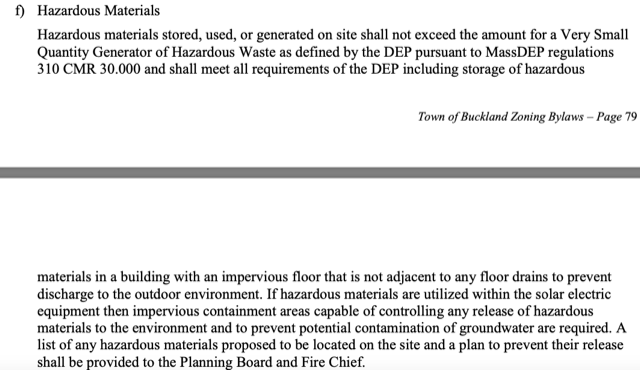State subsidies make it very profitable for corporations to build large ground mounted solar projects. There is no state law to make sure these are properly sited. The only way to protect our communities, forests, waterways and farmland is to use local zoning and home rule power.
Get your city or town to pass a strong solar zoning law.
Some examples:
Town of Warren: Bylaw and guidelines here.
Town of Buckland: Bylaw here – look at Section XIV, page 75.
Town of Shrewsbury: check the Town website.
Town of Shutesbury: proposed bylaw, October 2022, scroll down for solar report.
Town of Charlemont solar bylaw: article here.
Key parts of the Buckland solar bylaw:
Habitat Impacts. This can help protect forested landscapes. Don’t rely on the state DOER’s non-enforceable siting “guidelines” that refer to BioMap 2 to protect anything! Here is what Buckland’s bylaw says:

Hazardous Materials. This recognizes the potential of hazardous waste in the solar projects and provides some guidance for safety regarding the hazardous waste.

Other issues:
Lithium ion battery storage. Lithium ion batteries now being installed at an industrial scale a solar sites pose a risk to the public health, safety and welfare as documented in numerous studies. Most bylaws do not directly address this.
Another strong bylaw is from the Town of Shrewsbury, Massachusetts. Go to Section VII (R), here.
Pass a temporary moratorium on industrial solar
Faced with an onslaught of solar, Buckland passed a moratorium. State law allows ten residents, in most cases, to submit a petition. Write the petition to propose a moratorium
https://malegislature.gov/Laws/GeneralLaws/PartI/TitleVII/Chapter40A/Section5
The law on a moratorium petition is here: Mass. General Laws, Chapter 40A, Section 5: Adoption or change of zoning ordinances or by-laws; procedure
Section 5. Zoning ordinances or by-laws may be adopted and from time to time changed by amendment, addition or repeal, but only in the manner hereinafter provided. Adoption or change of zoning ordinances or by-laws may be initiated by the submission to the city council or board of selectmen of a proposed zoning ordinance or by-law by a city council, a board of selectmen, a board of appeals, by an individual owning land to be affected by change or adoption, by request of registered voters of a town pursuant to section ten of chapter thirty-nine, by ten registered voters in a city, by a planning board, by a regional planning agency or by other methods provided by municipal charter. The board of selectmen or city council shall within fourteen days of receipt of such zoning ordinance or by-law submit it to the planning board for review.
Here is a sample solar Moratorium Petition from the Town of Buckland, Massachusetts which was passed in order to give the town a chance to write a solar bylaw:
PETITION TO INCLUDE ONE ARTICLE ON THE WARRANT FOR THE ANNUAL TOWN MEETING OF THE TOWN OF BUCKLAND:
The undersigned petitioners request that the following articles be placed on the warrant for the annual town meeting:
To see if the Town will vote to amend the Town’s Zoning Bylaw by adding a new section, XII-1 a) and b), Temporary Moratorium on the Construction Large Scale Photovoltaic Systems, that would provide as follows;
a) Purpose.
The average size of a solar system that would provide electricity for residential use in Massachusetts is 5 kilowatts. The average size of a solar system to provide electricity for a barn or a sugar house is 35 kilowatts. The Town of Buckland contains very rural and undeveloped areas. There are currently no large scale photovoltaic energy systems in the Town. The Town of, or residents of, Buckland may be approached to develop large solar in the near future. Larger systems potentially could affect the Town as a whole. There is an identifiable community need to establish long-term zoning regulations to ensure that such uses and developments will be consistent with the Town’s long term planning interests. It is crucial that the Town establish a temporary moratorium on the use of land and the construction of structures related to such large scale photovoltaic systems and the issuance of building permits in connection with the same.
b) Moratorium
No building permit may be issued for the construction of any large scale photovoltaic system in size of more than 150% of the documented average annual use of a residential, commercial, business, municipal or agricultural application, and not to exceed 35 kilowatts, until June 15, 2013. The purpose of this temporary moratorium is to allow sufficient time to engage in a planning process to address the effects of such structures and uses in the Town and to enact bylaws in a manner consistent with sound land use planning goals and objectives, or take any action related thereto.
Submitted by
| Name – Printed | Name – Signed | Residence Address with street number |
Other resources
Citizens for Responsible Solar in Virginia 4,500 acres are threatened by industrial solar. https://www.citizensforresponsiblesolar.org/solar-ordinance
“As the demand for renewable energy increases, solar developers are aggressively seeking to build more industrial-scale solar power plants on agricultural land, as opposed to using appropriate land already zoned for industrial use. Rural counties are a prime target. More agricultural land is being threatened.”
To protect your county and its residents, a solar ordinance is an important piece of legislation that clearly outlines the provisions of an acceptable application and the construction of a solar power plant.
Counties that do not have a solar ordinance in place are disadvantaged given the complexities of large-scale construction and potential environmental dangers, and small rural counties, in particular, do not have the resources or the expertise to manage and monitor these projects. “
